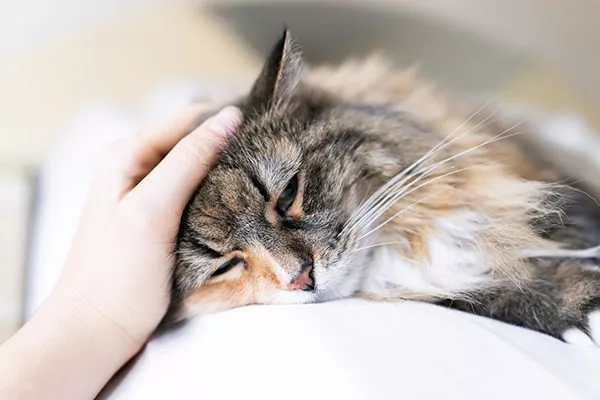Signs & Symptoms of Feline Leukemia: What Cat Owners Need to Know
As a cat owner, it’s important for you to understand everything you can about feline leukemia. This terrible cat illness is sadly a common one, and if your cat is unvaccinated against it, they are at risk. For this reason, you should learn how to recognize the signs and symptoms of this condition as early as possible.

In the article below, you’ll find out more information about the signs of feline leukemia. You can use this information to figure out when it might be time to speak to your vet for more information and a full diagnosis.
Fever and Pale Gums
Cats with feline leukemia tend to run a fever often. The fever may be a low one, or it may be very high and could cause your cat to be quite ill. Either way, frequent fevers are a sign that your cat is dealing with a serious disease like feline leukemia and should be checked out right away.
Fevers lead to pale gums and sticky saliva in cats as well. If you notice your cat’s gums are paler than usual, this could be a sign that she has a fever you haven’t yet noticed.
Diarrhea and Vomiting
One of the earliest signs of feline leukemia in most cats is severe diarrhea. Cats may suffer from diarrhea every day, even to the point of having diarrhea each time they go to the litter box. The diarrhea may be soft or may be completely liquid, depending on the situation.
Vomiting is similarly a common symptom associated with feline leukemia. Cats may feel nauseated often from this disease, which may lead them to vomit frequently. If your cat’s diarrhea and vomiting grow serious, she may be unable to retain the nutrients she needs from her food.
Weakness and Lethargy
The longer your cat remains sick from feline leukemia, the more likely they will be to grow weak and lethargic. They may be unwilling to get up out of bed often, or they may be unable to do so, depending on the severity of the illness.
You may notice your cat is no longer interested in playing very much, either. Although it is difficult to see your cat like this, a loss of interest in activity is part of the progression of feline leukemia. If your cat suddenly stops wanting to get up and move at all rather than slowly progressing to this point, talk to your vet right away.
Disinterest in Food or Water
Some cats, especially those who are very sick with diarrhea or vomiting frequently, may not be interested in eating food. In this case, your cat will need to be fed a diet that encourages her to eat, since she will be unable to get the nutrition she needs otherwise.
Cats may also be uninterested in drinking water if they are extremely sick with feline leukemia. Your cat needs to drink water and should not be allowed to go more than a day without water. If your cat refuses to drink or ingest liquid at all, talk to your vet right away.
Dehydration
Dehydration is a secondary symptom that comes as a result of the nausea, vomiting, and fever associated with feline leukemia. Cats are not known for drinking enough water most of the time anyway, but a cat who is very sick may not have nearly enough fluids for their health, either.
You can help your cat by feeding them wet food some or all of the time. You may also choose to add a little water or plain, unseasoned chicken broth to their dry food to “sneak” some more fluids into their diet.
Difficulty Breathing
In the late stages of feline leukemia, cats may develop difficulty breathing. Cats who have reached this stage likely do not have much longer to live, although your vet can tell you for sure how the illness is progressing for your pet.
Difficulty breathing may be noticeable if your cat’s sides are heaving with every breath, even when they’re at rest. You may also hear wheezing or might notice a slight rattle in the sound of your cat’s breath as well. All of this is normal, although it means the disease is getting worse.
Your Cat Can Still Have a Happy Life with Feline Leukemia
Feline leukemia is a difficult disease for cats to deal with. However, with the right maintenance and care from you and your vet both, you can give your cat the best chance at a happy life throughout the remainder of their disease.
Remember that you should take your cat to the vet often during this process. Keeping up with regular vet visits as well as vaccinations as recommended by your vet can make a big difference in your cat’s ability to live as long as possible while dealing with feline leukemia.
